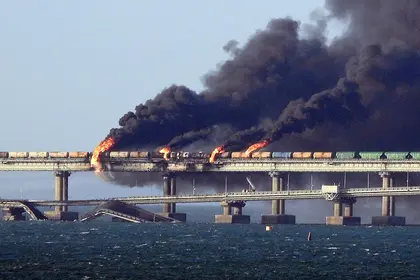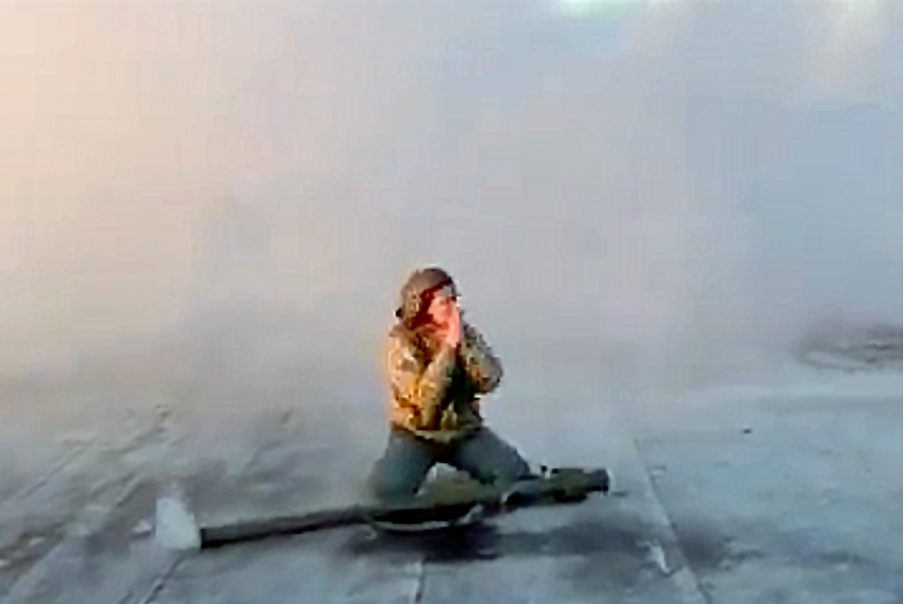In a documentary titled “Special Operations for Victory,” broadcast Nov. 24 on Ukrainian TV channel 1+1, the head of the Ukrainian Security Service (SBU) and other military officers released details of two attacks on the Kerch Bridge.
So far, Ukraine has conducted two successful strikes on the Kerch Bridge that serves as a logistic lifeline between occupied Crimea and Russia’s mainland. The first attack took place on Oct. 8, 2022, a day after Russian President Vladimir Putin’s 70th birthday, which set the bridge on fire.
JOIN US ON TELEGRAM
Follow our coverage of the war on the @Kyivpost_official.
According to SBU Head Vasyl Malyuk, hexane – RDX-based explosives – was used in the first attack.
“So-called improvised explosive devices were used, and the hexane mixture amounts to roughly 15 tons, which is roughly 21 tons in TNT equivalent,” he said.
Earlier, Kyiv Post reported that Malyuk had not disclosed the logistics behind the operations, but hinted that a network of commercial suppliers was used to obscure the cargo origin.
The second attack took place in July this year using unmanned surface vehicles (USVs, commonly known as sea drones), which damaged the structural integrity of the bridge and led to the collapse of certain bridge sections.
“We hit the bridge for the second time on July 17 this year using the ‘Sea Baby’ naval drones,” Malyuk said.
The second attack was a joint operation between the SBU and the Ukrainian Navy, where the SBU collected intelligence on the bridge itself, including the technical documents that specified the materials used to construct the bridge.

Thirty Years Ago, Today, Ukraine Began Process to Give Up its Nuclear Deterrent
While most information was gathered through open-source channels, a video posted by a woman on a yacht proved to be essential in determining the integral structure of the arch supporting the bridge, according to a counterintelligence officer operating under the callsign “Racoon.”
“This information gave us an understanding of which point should be attacked to [maximize the damage],” he said.
“Every Russian with a smartphone is our best friend, comrade and client,” said another counterintelligence officer.
While the main supporting columns of the bridge were hard to destroy, the columns were supported by a series of broom-like columns with small diameters that could be exploited and, in theory, pull the bridge down.
With that in mind, a new drone capable of carrying 800 kg of TNT with a minimum range of 800 km was developed – and this is what would become the “Sea Baby,” the drone used in the Kerch Bridge attack.
According to an officer, five USVs were deployed in the operation, with two leading the way to conduct reconnaissance. The drones spotted Russian Frigate Admiral Essen on the way, and the remaining three USVs gave chase to it, but to no avail, ultimately self-detonating off the coast of Yalta.
According to an SBU brigadier general under the callsign “Hunter,” the intention was to hit the columns supporting the railway section of the bridge, but a course deviation led to the attacks on the car section instead.
The construction of the Kerch Bridge started in 2016, and it connects occupied Crimea with mainland Russia, serving as a significant logistic route to resupply Crimea. Putin personally inaugurated the car section of the bridge in 2018.
“Russian propaganda is based on the symbols of the Crimean bridge – it is a symbol of power for the Russian state,” said Oleksiy Neizhpapa, commander of the Ukrainian Navy.
As the Ukrainian counteroffensive continues, it remains one of the few rail connections Russia could utilize to supply Crimea and occupied territories in southern Ukraine.
Since the bridge remains a strategic target for Ukrainian attacks, with an elite unit hinting at attacks in the near future in a video released five days ago, there have been rumors of a joint Russian-Chinese tunnel construction project that Russia would hope to provide an alternative to the vulnerable Kerch Bridge.
You can also highlight the text and press Ctrl + Enter






